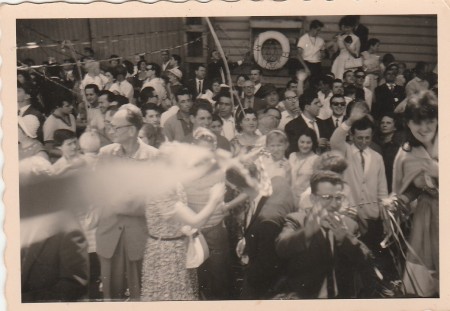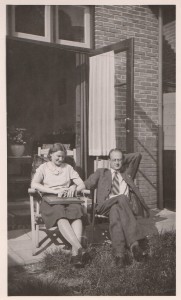The above photo of my parents standing on one the quay’s of Sydney harbour. I have some doubt of when this photo was taken. Was it on the day of arrival? Why is that man at the front clapping his hands? My father (Bald head) seems to be a bit bewildered. The lady with handbag is my mum. In any case, all seem happy!
Soon we were all packed in a convoy of buses and heading towards our migrant camp, Scheyville. My milkshake and sandwiches bedded down, the adventure and first glimpses of Australia would now roll past. Those first images were vital and I hope the remembering is as truthful as possible. Did those fleeting images already set in motion future opinions and possible prejudices of Australia? Was I seeing my first glimpses of future resentments? I really can’t answer that. As a fifteen year old I would have been bursting with excitement in seeing a foreign country. There can’t be any doubt about that!
We had already seen Fremantle and Melbourne. Fremantle was on a Sunday during a period when Sundays were expected to be spent on reflections of mother England and caring for lawns. Melbourne did have people about and we took a train trip to the inner city. The train carriages were made of wood and so were many of the cars. I could not believe the age of cars, they seemed out of a world of my meccano set, given by my parents a couple of years before migration. Some of the cars in Melbourne had to be wound up by a large handle at the front.
Above photo of my parents still in Holland. A great picture of happy life, contentment. I don’t know what that board was in her lap. It could have been a crocheting work in progress. My mother was always doing something, rarely did nothing. Glad to see the grass was unkempt. Dad seems dreamily serious.
As our bus took off, it soon founds its way on a very busy road. I noticed large signs and many car sales yards with car bonnets open as if yawning or waiting to be fed. Later on I found out the road was called Parramatta Rd. About an hour along the journey or so the bus stopped and the driver walked across the road and disappeared into a pub. He left us baking inside the bus, but so what, it just allowed the passengers to see more carefully of so much that was new and different and the driver to get a couple of schooners of beer. Within a few month I noticed that beer drinking was very popular, as long as it was done before 6PM. Pubs closed at 6, allowing husbands to get home and if possible hand over the pay-packet before it all got pissed up against the porcelain. It is a hot and harsh country and beer does alleviate it.
The photo above is compliments of Google and is not mine. Notice the prevalence of men. Some time later the shortage became acute and I remember a rail bridge in Sydney with a large hand-painted sign, “Australia a country of men but no women”.
When we arrived at Scheyville we were more or less abandoned. There was someone who gave us a number for our accommodation. We had no clue as what to expect. No film footage at The Hague Embassy ever showed us converted metal corrugated Nissen Huts to be for many migrants and refugees the first form of accommodation. We just saw coloured films of postmen jumping fences giving glad tidings to very happy home owners standing tall on the well manicured lawns, beaming with happy and wearing gleaming white teeth in total sympathy with white picket fences. The same with newspapers being chucked onto same front lawns. It all seemed so very unregimented and free, so jolly and sunny.
Compliments Google.
As we found our accommodation corresponding with our given number it was a surprise to be shown ex-army huts. Nissen huts to be precise. This looked very regimented and was totally without smiles. Mum said: “Oh this must be for our bikes”, grabbing her first impression, hoping against all odds this wasn’t for sleeping in, surely not! Her Dutch-ness escaped into a desperate hope this hut was for our bikes, soon to be provided. Holland of course a bicycle is part of all life. Why not here as well? But why would bicycles have mattresses and chairs? Within a few minutes reality set in but my mum immediately accepted and got busy settling in. She was the hero of all migration and should have been given a Dame hood, surely? We had suitcases with the basics and soon we had our bedding arrangement sorted out. The bedside drawers had some crusts of bread in them. Later on we met a Dutch couple who had been in exactly the same Hut just before us and had abandoned the bread in the drawers. We laughed heartily about that for many years to come. ( It wasn’t all sad.)
Tags: Dame-hood, Dutch, Nissen, Parramatta Rd, Scheyville




April 30, 2015 at 4:23 am |
Really enjoying these reminiscences, Gerard. 🙂
LikeLiked by 2 people
April 30, 2015 at 6:53 am |
Thank you. Much is still to come!
LikeLiked by 2 people
April 30, 2015 at 4:32 am |
Wow. Had that been my arrival at the huts I would have called that a rude awakening. I’m sure you mother was most likely dismayed but did not let on for fear it would be contagious among the rest of the family, After all it had been the adults who had made the decision to immigrate.
How long was your stay in the hut? And was it very hot or cold in the hut during your time there?
LikeLike
April 30, 2015 at 6:57 am |
We did not stay long, perhaps a few weeks after which we moved in with our friends from Holland.
It was very hot and humid with the surrounding areas flooded which made getting away somewhat difficult. The best part was unlimited jam in huge 1 gallon containers with large chunks of fruit in it.
You are right, mum was determined to pull through and was the driving force behind the endeavour to find a better life.
LikeLiked by 2 people
April 30, 2015 at 4:41 am |
Memory lane! We lived in nissan huts as well, being a family of 13 we got to have 2! I remember the feeling of lots of space after 6 weeks on a ship
LikeLiked by 1 person
April 30, 2015 at 6:59 am |
When did you and your family arrive in Australia? My brother and I used the time to discover surrounding area and look at wildlife. I was fascinated by the Blue Mountains in the distance.
LikeLike
April 30, 2015 at 8:08 am |
This is first rate, as usual. Great image of cars with their bonnets open. (Looking ahead to your recollections appearing in book form, the huts are Nissen. Nissan s a car company. I think Nissen huts may be comparable to Quonsets in the US.)
LikeLike
April 30, 2015 at 8:26 am |
Thanks for the edit Rod. All fixed. There is still much to come and I welcome and like any advice to publish a book in paper format. We will see.
LikeLiked by 2 people
April 30, 2015 at 9:55 am |
Replying to a comment is next to impossible for the lines jump around and I can not get to the bottom to then send a reply o., I’ve been resorting to returning to folks blogs if I want to add another comment.
I’m glad that your family did not have to remain long in what seems to have been a sweat box and a hole from hell.
I reckon you mother was a saint to have been the backbone of the family and sure grit kept her going during those trying times of duress and disappointment.
LikeLike
April 30, 2015 at 11:01 pm |
Yes, without my mum it would all have collapsed. She had an iron will and was extraverted enough to initiate putting shoulders under difficult tasks that laid ahead. Unlike dad who spoke some English mum would just ask for things in Dutch. She was fearless.
Ivonne, you are right again, she was a saint.
LikeLiked by 1 person
April 30, 2015 at 6:31 pm |
I chuckled at the metaphor of white teeth and picket fences! Your memories are unique to you, and so interesting to all of us. I like the peaceful scene of your parents holding hands on a sleepy afternoon. I imagine it was awhile before they could repeat it in Australia.
LikeLiked by 2 people
April 30, 2015 at 11:02 pm |
Yes, they were happy times and taken before WW2 and without any children.
LikeLike
May 1, 2015 at 4:01 pm |
It’s fascinating to read your accounts of leaving Holland and the war. My grand-parents had to flee from Holland too and their story, like yours, is quite remarkable. The adversity that they had to put up with, the POW camps, sleeping under hedgerows, waiting for boats to escape on….My grand-father was sent to prison, the Brits thought that he was a German spy!! and so much more. I wonder what your Ma and Pa made of it all? It must have been so tough for them leaving Holland, their families, their friends – everything. Thank you for sharing your stories, Gerard.
LikeLike
May 4, 2015 at 11:09 am |
Can’t wait for the installment when your parents meet up with the enthusiastic Dutch friends who sold them on the move!
LikeLike
May 9, 2015 at 5:18 pm |
A whole world I never knew about.
LikeLike